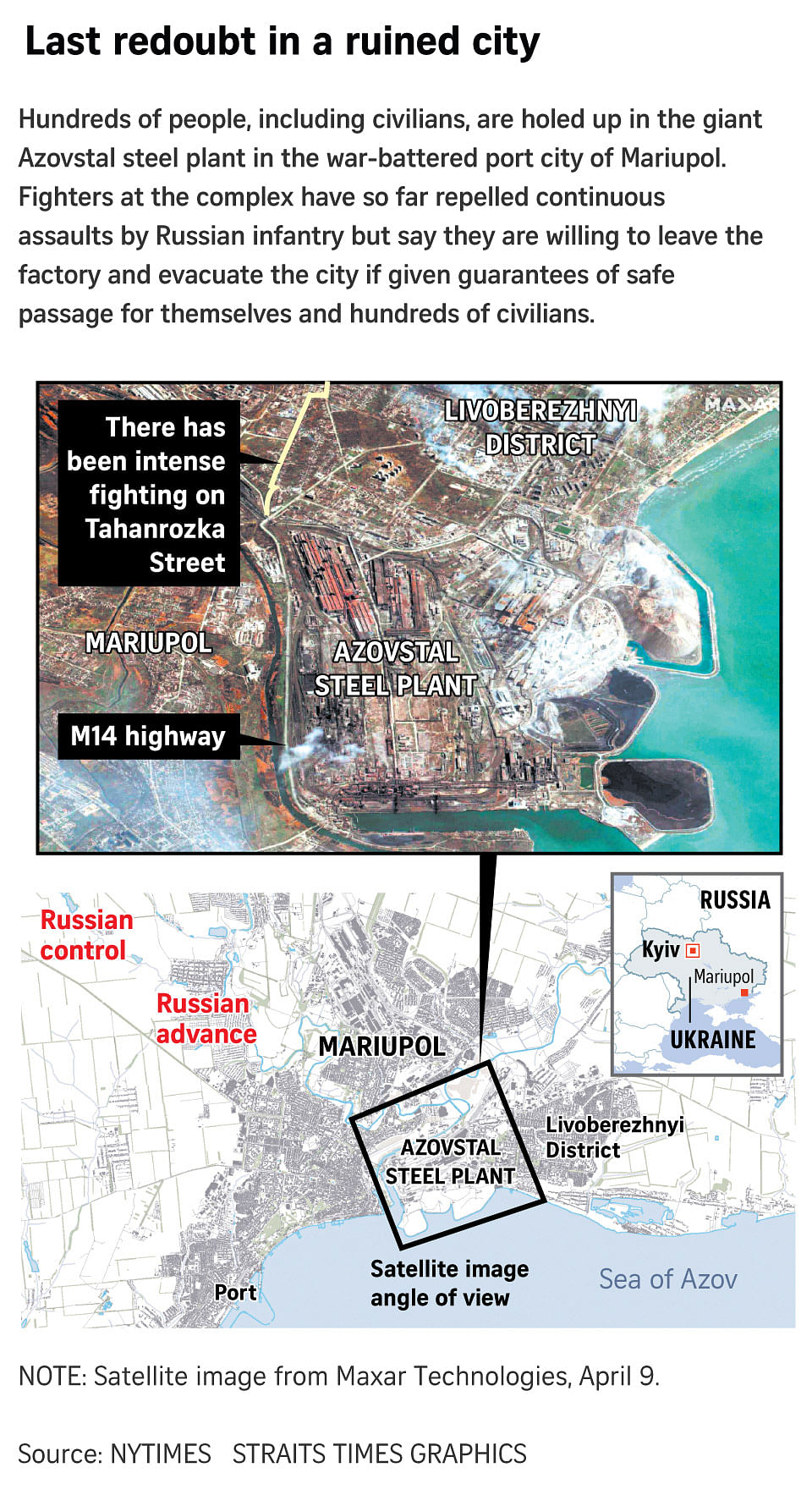ZAPORIZHZHIA, UKRAINE (NYTIMES) - Ukrainian forces are still in full control of the Azovstal steel plant in the war-battered port city of Mariupol and have repelled continuous assaults by Russian infantry even while weathering steadily intensifying air and artillery attacks, a commander of one of the Ukrainian units defending the plant said in an interview on Sunday (April 24).
Ukrainian forces are willing to leave the factory and evacuate the city if given guarantees of safe passage for themselves and hundreds of civilians, said Captain Svyatoslav Palamar, deputy commander of the Azov Battalion, whose fighters have been holed up at the plant since March 1.
"We are prepared to leave the city because there is nothing left to defend," Capt Palamar told The New York Times by phone from inside the plant.
"We consider that we've fulfilled our mission. But we will continue to defend it until there is an order to retreat from our military leadership. And if we are going to leave, we are going to leave with our weapons."
On Thursday, Russian President Vladimir Putin issued an order to halt the assault of the Azovstal factory.
He called for a blockade instead, but the fighting continued, drawing crucial resources from Russian forces, even as preparations were under way for a significant offensive in eastern Ukraine.
"Despite the fact that today is an important Christian holiday, they bombed the factory all night," Capt Palamar said.
The defence of the Azovstal factory in Mariupol is emblematic of the fierce and, to many, unexpected resistance of Ukrainian forces against their more powerful and more numerous adversaries.
For nearly two months, a relatively small band of fighters has withstood a relentless barrage of attacks from land, sea and air, continuing to maintain a defensive perimeter that has prevented Russian troops from entering the territory of the plant, according to soldiers and officials.
But Capt Palamar and other soldiers said that they are short on time. Stocks of ammunition are dwindling and, perhaps more critically, rations of food and water are running dangerously low.
It is not clear how many people remain inside the plant - a sprawling complex consisting of a number of buildings with deep reinforced concrete bunkers that have been difficult for Russian forces to penetrate.
What is certain is that no one is coming for them. The rings of Russian defences around the city are too heavily fortified for Ukrainian forces to mount an attack.
Ukrainian fighters at the plant say that they hope some neutral country might work to broker a deal that could allow them and the civilians sheltering in the plant to escape, perhaps by sea.
On Saturday, Ukrainian President Volodymyr Zelensky said he had discussed with his soldiers the impossibility of Ukraine's military swiftly breaking through to their position by attacking from outside the Russian encirclement.
There would be no immediate rescue.
"We are not preparing it at this moment," he told the reporters gathered in the Maidan Nezalezhnosti subway station in Kyiv, the capital.
"They clearly understand this. That is the reality."
In the interview, Capt Palamar indicated that the Ukrainian fighters at the plant were not satisfied with efforts being made to extract them. He called on the military and political leadership of Ukraine "to save the lives of our fighters, who have done so much for this war, who have died heroically, been wounded and held practically the entire south-eastern military group".
"We can't get out ourselves. Not without help," he said.
Capt Palamar would not say how many fighters remain alive and in fighting condition, but he admitted that more than 500 were wounded, some seriously.
The conditions, particularly for the wounded, are grim. There is a field hospital, but very little medical equipment or medicine remains.
Video from inside the hospital that he sent via WhatsApp shows pale, largely motionless soldiers with an array of gruesome injuries sprawled on mats on a concrete floor.
Anaesthesia drugs are running low and some of the wounded require amputations, Capt Palamar said.
Every day brings new fighting and death, he and others at the plant said. The battle for Azovstal is being waged along a defensive ring on the outer rim of the factory complex, although heavy bombing has slowly reduced the areas from which Ukrainian soldiers can carry out the fight.
As Russian forces have used increasingly large and powerful weapons, cave-ins have become a more common cause of death, he said, both to civilians and soldiers.
Fighting at the plant is being waged by a number of Ukrainian groups, including national guard units, regular army, volunteer battalions and even some police officers. But the primary fighting force is the Azov Battalion, which is part of the National Guard of Ukraine.
It is a force that does include nationalist soldiers, which the Kremlin has used to paint the unit as fascist. The unit has evolved into a regular combat force within the Ukrainian military.
Capt Palamar and others have ruled out surrender to Russian forces, saying they do not trust the Kremlin's guarantees that it would abide by rules governing the treatment of prisoners of war.
"No one wants to surrender and end up in the hands of the Nazis or the Gestapo," he said.
"There are many examples of soldiers ending up as prisoners and contact with them is lost. Their fates are unknown."


